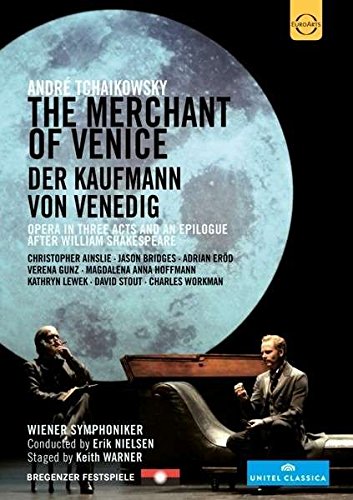A TCHAIKOVSKY The Merchant of Venice
View record and artist detailsRecord and Artist Details
Composer or Director: André Tchaikowsky
Genre:
Opera
Label: Euroarts
Magazine Review Date: 11/2014
Media Format: Digital Versatile Disc
Media Runtime: 160
Mastering:
DDD
Catalogue Number: 207 2708

Tracks:
| Composition | Artist Credit |
|---|---|
| The Merchant of Venice |
André Tchaikowsky, Composer
Adrian Clarke, Salerio, Baritone Adrian Eröd, Shylock, Baritone André Tchaikowsky, Composer Charles Workman, Bassanio, Tenor Christopher Ainslie, Antonio, Countertenor David Stout, Gratiano, Baritone Elliot Lebogang Mohlamme, Prince of Morocco Erik Nielsen Hanna Herfurtner, Boy, Soprano Jason Bridges, Lorenzo, Tenor Juliusz Kubiak, Prince of Aragon Kathryn Lewek, Jessica, Soprano Magdalena Anna Hofmann, Portia, Soprano Norman Patzke, Solanio, Bass-baritone Richard Angas, Duke of Venice, Bass Verena Gunz, Nerissa, Mezzo soprano Vienna Symphony Orchestra |
Author: Mike Ashman
More than just The Merchant of Venice’s title and setting remind one that Britten’s final Thomas Mann opera was an exact contemporary. Tchaikowsky’s decidedly post-Romantic 20th-century score has clearly heard and absorbed the form and lyricism of a Britten influenced by Berg without being derivative of either. He proves as able a musical narrator as these two forerunners, moving along in gripping fashion a story which, with its pairs of characters, disguises and debates on love, turns out not unlike a darker Così fan tutte. (John O’Brien’s libretto is faithful to the play’s main intrigues while omitting its groundling comedy.) He also commands a musical palette wide enough to put dramatic space around Portia’s ‘The quality of mercy’ soliloquy and encompass a vaudeville-style handling of the ensemble passages in the street outside Shylock’s house or during the choosing of the caskets scene.
The production and its realisation here are extremely happy events. Scenes come and go swiftly in between mobile trucks and walls – the bricks of Shylock’s house are numbered bank strongboxes. Costumes are Edwardian – period enough to be historical in feel yet modern in movement and, aptly, the high noon of great Jewish international financiers. Cunning casting mixes German-speaking artists with excellent English – the feisty Portia/Nerissa team, Adrian Eröd’s beautifully balanced Shylock – and the more expected Brits and Americans as whom one used to call the gay young youth of Venice. Keith Warner handles all this onstage with a deft mix of the light (Gratiano dim and keen, Salerio and Solanio roving journalists) and the serious (Antonio’s evident attraction to Bassanio and sadness at not being able to share the others’ marital heterosexual bliss). There is real menace in the courtroom scene, presided over by the late Richard Angas’s nicely equivocal Duke, when the obsession of Eröd’s Shylock with his ‘bond’ wipes out the wit he showed earlier in the Rialto stock exchange scene and calls forth real sternness from Magdalena Anna Hofmann’s Portia.
Playing, conducting and filming serve piece and production well; hugely recommended, and an event to which you may be tempted to return often.
Explore the world’s largest classical music catalogue on Apple Music Classical.
Included with an Apple Music subscription. Download now.

Gramophone Digital Club
- Digital Edition
- Digital Archive
- Reviews Database
- Events & Offers
From £9.20 / month
Subscribe
Gramophone Club
- Print Edition
- Digital Edition
- Digital Archive
- Reviews Database
- Events & Offers
From £11.45 / month
Subscribe
If you are a library, university or other organisation that would be interested in an institutional subscription to Gramophone please click here for further information.






